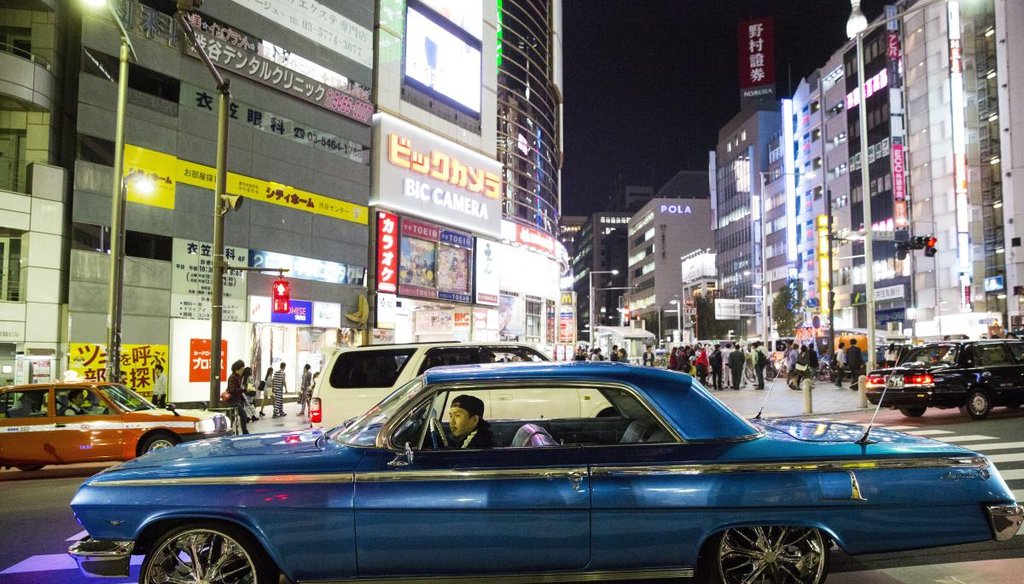Stand up for the facts!
Our only agenda is to publish the truth so you can be an informed participant in democracy.
We need your help.
I would like to contribute

A man drives a 1962 Chevy Impala in Shibuya, a ward of Tokyo, Japan on Oct. 30, 2015. (Eve Edelheit | Tampa Bay Times)
TOKYO — Billionaire businessman Donald Trump’s presidential campaign hinges on Americans who share Trump’s assessment that the United States is losing all over the world.
In Mexico, we’re outsmarted on the border. In China, it’s trade and currency manipulation. In the Middle East, it’s the terrorist masterminds of ISIS.
In Japan, we’re losing at selling cars.
"When did we beat Japan at anything?" Trump said in his campaign announcement speech back in June. "They send their cars over by the millions, and what do we do? When was the last time you saw a Chevrolet in Tokyo? It doesn’t exist, folks. They beat us all the time."
That statement, like many Trump has made, is not 100 percent accurate. PolitiFact rated it Mostly False. The iconic American automaker does sell Camaros and Corvettes in Japan.
Yet here in Tokyo, the kernel of truth in Trump’s exaggerated claim is easier to see. In 2014, General Motors notched just 597 sales of Chevrolet vehicles from official dealers in Japan. Through October 2015, that figure is 428.
Even President Barack Obama, an unlikely Trump ally, earlier this year questioned the lack of American cars on the roads in Tokyo as he pushed for increased trade with a group of 11 Pacific rim nations.
"When you travel to Tokyo, you don’t see Fords. You don’t see Chevys. You don’t see Chryslers," Obama said.
I did, though it wasn’t easy.
Surprise in Shibuya
Tokyo’s trendy Shibuya ward is recognized around the world for the crossing hub outside its subway station, with vehicles whirring from four directions as rivers of pedestrians wait to cross the road. The space buzzes on the night before Halloween as young people dressed as Minions, zombies, Nintendo characters and sexy whoevers pose for photos and clutch drinks.
There, in the middle of it all, appears the sight of sky-blue American muscle.
The driver grins as a photographer snaps pictures of him behind the wheel of his third-generation 1962 Chevrolet Impala, his windows down, music up, and hand in a rock-and-roll fist.
That’s precisely the reaction for which he, probably handsomely, paid.
American cars are a novelty in Japan, with its narrow streets that brim with compact domestic brands Toyota, Honda, Nissan, Suzuki, Mazda and Subaru. In 2014, Japanese automakers accounted for 92 percent of the 5.45 million vehicles sold there, according to financial research group IHS Automotive.
In three weeks roaming several major cities in Japan, including Kyoto, Osaka and Hiroshima, I saw just that sky-blue Chevy Impala, a black Ford Focus hatchback and a Lincoln stretch limousine with tinted windows.
That’s the anecdotal evidence for how few American vehicles roam Japan. The statistics drive home the point. From January to October 2015, there were 666 new Chevrolet vehicle registrations, a drop from 1,067 registrations during the same period in 2014, according to the Japan Automobile Importers Association. (Unlike GM’s figure, this accounts for all registrations of imported vehicles, not just official dealers.)
Spokespersons for Chevrolet did not want to comment about its strategy in Japan, declining to allow its official dealers there to be interviewed. Instead they highlighted the company’s efforts in other countries of southeast Asia, its record sales in China, engineering and design facilities in South Korea, and new investment in India.
Obama has hailed the Trans-Pacific Partnership as a way to address the car trade imbalance, and Japan, which does not impose a tariff on American imports, has agreed to appease some of the United States’ concerns as part of joining the trade deal. The Office of the United States Trade Representative calls out "non-tariff measures" that hurt American exports, like "opaque" regulatory development and drawn-out certification procedures that stall cars from entering the marketplace.
Still, regulatory hurdles for exporters can’t be the only reason the Japanese aren’t that into American cars. European brands Mercedes-Benz, Volkswagen, BMW and Audi outsell American manufacturers by the tens of thousands.
Over and over again, I heard the same explanations: Japanese consumers prefer more compact and fuel-efficient cars to navigate their tighter roads.
Allen S. Greenberg, U.S. consul general for Osaka-Kobe, has noticed more cars with greater capacity, like minivans, on the road now than in the early 2000s, when he was studying U.S.-Japan economic relations in the Tokyo embassy. Finding parking, and then managing to park inside tiny spaces, remains as big a challenge as ever, he said.
"I think the Japanese are very willing to drive imports, but they have to be imports that make sense with the local conditions," he said. "And that means probably smaller than many cars that we drive in the States."
There are some facets of the trade deal that may make American car sales easier in Japan, but overall the language isn’t likely to be the magic formula that will fix the problem, said Sarah Oliver, a trade policy research analyst at the Peterson Institute for International Economics who focuses on the auto sector. She noted the popularity of Chevrolet and Ford trucks among Americans.
"It might just be what the American carmakers are good at may not be what the Japanese want," Oliver said.
Lonely day at the lot
It’s Saturday afternoon at a used car dealership outside of Osaka, and Yuya Nagata is approaching the end of his shift as a sales associate at BUBU West, which sells used American and European imports.
Fridays, Saturdays and Sundays are usually his best days for sales, but this Saturday is especially slow.
"Actually today was a boring day," Nagata said. "Nobody came today."
At BUBU West, the lone Chevrolet for sale is a bulky, black 2004 Suburban. The dealership had just lowered the price to 2.89 million yen, which converts to roughly $24,000.
BUBU West belongs to Toyama-based car importer Mitsuoka Motor Group. The company’s motto is "dream, hope, pleasure," which perfectly encapsulates the reasons a Japanese consumer would splurge for an American car.
Earlier this year, Nagata sold three Chevrolet Corvettes, including one to a 23-year-old man in May who wanted to celebrate career success.
"He was dreaming about Chevrolet and bought one," he said.
The typical American car customer in Japan is a car "maniac," he said, someone who cares about looking different and doesn’t mind the pain of maintenance in a country where American parts aren’t abundant.
His company imports left-hand-drive vehicles, the opposite side of Japanese cars, from a company called BUBU California Direct and brings the vehicles in line with Japanese car standards. American blinker colors are red, for example, so they have to change them to orange.
A lot of people don’t want to go through the trouble.
Nagata hasn’t sold a Chevy since August, though a colleague sold a Trailblazer sometime in the fall.
Sadanori Shibui manages a sister store in Osaka that sells replicas of classic cars. He sold Chevys and other American cars back in the 1990s.
Because of a lack of maintenance options for Chevy owners, many consumers got the impression that Chevys break down easily, he said. That concern plus the left-side steering wheel and limited selection of models are the reasons he thinks the dream of owning a Chevy remains for most Japanese just that.
A dream.
"Many people like Chevy because it’s cool-looking," Shibui said. "But many people, when they go to buy it, it’s reality. That’s the problem: image and reality."
Katie Sanders traveled to Japan as part of a reporting fellowship from the International Center for Journalists. Japanese translator Junko Takahashi contributed to this report.
Our Sources
Interview with Afaf Farah, Chevrolet spokeswoman, Nov. 24, 2015
Interview with Sarah Oliver, Peterson Institute for International Economics, Nov. 24, 2015
Interview with Sadanori Shibui, Mitsuoka Motor Group, Nov. 7, 2015
Interview with Yuya Nagata, BUBU West sales associate, Nov. 7, 2015 Interview with
Trevor Kincaid, Office of the U.S. Trade Representative spokesman, Nov. 24, 2015












































